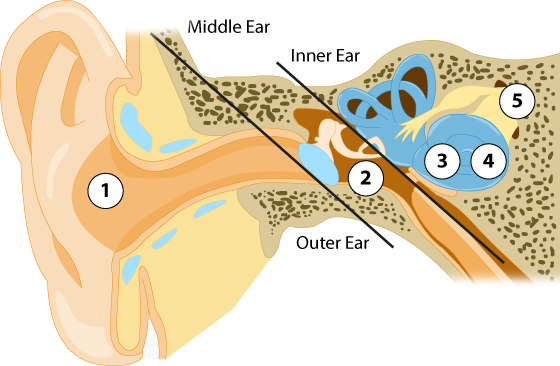Hearing is very complex. The process takes the different parts of the year working together with the brain. Following this process, that involves receiving, converting and interpreting the sound, you get the sound that you hear.
Communication is essential in everyday life. Understanding sound is only a small part of how the process works. When hearing loss is a possibility, Evolution Hearing steps in to resolve the problem. Instead of waiting for things to go wrong, patients should have a better understanding of how brain hearing works. There are three main parts of the ear that dictate how sounds are sent and received.

How Hearing Works
Outer Ear
The outer ear captures sound from the outside and sends it to the middle ear. The pinna and the ear canal make up the two parts of the outer ear. The pinna is the soft and flexible part that is the most visible part of an ear. When sound is directed into the ear, it is the pinna that helps the brain detect which direction it came from. The ear canal is just as important, and is better known as the physical pathway sound has to travel through the ears. Together, the pinna and ear canal play an important role in how the middle ear receives sound.
Middle Ear
The tympanic membrane is where it all starts for the middle ear. An alternative name for this membrane is the eardrum, which reacts to soundwave pressure. When the vibration from sounds surpasses a certain threshold, it can cause damage and discomfort. Aiding with the processing of sound are three small bones called the ossicles. They are directly connected to the eardrum and help deal with sound vibration. The last of the three bones in this area is called the stapes, with a shape that mimics a stirrup.
Inner Ear
Hearing balance can be attributed to the reliability of the inner ear. This is why inner ear infections can be so devastating. Within the inner ear are several organs that covert regular sounds and vibrations into nerve signals. Well placed hair cells in the area react to the signals and carry them to the appropriate organ. At this point, the sound goes through several ‘relay stations’ until it reaches the intended target. The final destination for this information is the brain, but not before it gets filtered through several of these points. When the auditory cortex gets this information, the sound is interpreted in a way the brain understands best.
How Sound Travels to the Brain
Traveling along the auditory nerve, electrical impulses go through multiple information-processing centers. Signals originating from your right ear are sent to the auditory cortex that is located in the temporal lobe on the left side of your brain. Signals travel from your left ear to your right auditory cortex.
The job of the auditory cortices are to divide, process, translate and file information gathered about the sound. The signals that are reaching the brain being compared and analyzed will allow you to differentiate particular sounds. The comparison and analysis of all the signals that reach the brain enable you to detect certain sounds and diminish others as noise in the background.
Balance Issues
Balance issues are closely related to hearing loss. The system that helps you maintain your balance, the vestibular system, is mostly located deep in the inner ear. The inner ear is made up of two parts: the labyrinth and the cochlea. The labyrinth is what is responsible for your ballots. Many conditions, as well as physical injuries and infections, can cause problems with hearing and balance. The treatment prescribed for your dizziness or hearing loss, depends on the reason it is happening. Some treatments that can help with issues with balance include:
- Treatments that move the small crystals in the inner ear
- Antibiotics if infection is present
- Corticosteroids
- Vestibular physical therapies
Some hearing issues can be fixed with treatment. Sensorineural hearing loss, that happens if damage occurs to the hair cells that are in the inner ear, is permanent, but can be slowed down by lifestyle changes. Paying attention to and eliminating factors that may be causing your hearing loss is essential in preventing future loss.
If you’re concerned your hearing isn’t as clear as it should be, contact one of our doctors at Evolution Hearing to have your hearing ability evaluated and the right course of treatment recommended if necessary.




